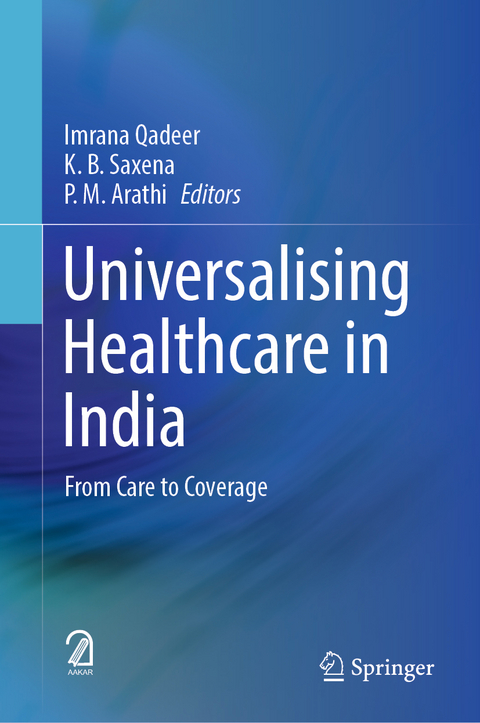
Universalising Healthcare in India
Springer Verlag, Singapore
978-981-16-5871-6 (ISBN)
Imrana Qadeer is a Distinguished Professor at Council for Social Development, New Delhi, India. She is a well-known public health expert. Before joining CSD in 2012, she was a professor in Jawaharlal Nehru University, where she taught for 35 years and then served as a J.P. Naik senior fellow at the Centre for Women’s Development Studies. Her area of interest includes organizational issues in health services in South Asia with a special focus on India, social epidemiology and political economy of health, women’s health and research methodology with an emphasis on interdisciplinary research methodologies. She has also worked with the Ministry of Health and Family Welfare, the Planning Commission, Population Commission and the advisory and monitoring bodies for the National Rural Health Mission. K B Saxena is a Distinguished Professor at Council for Social Development, New Delhi, India. He was a teacher of Political Science in the University of Delhi before he joined the Indian Administrative Service in 1964 and held important government positions such as Joint Secretary, Land Reforms; Additional, Chief Secretary, Government of Bihar; Secretary in the Ministries of Welfare, Rural Development and Health, Government of India. He was Principal Adviser to the Planning Commission as well. Prof. Saxena prepared the report on Atrocities against Scheduled Castes for the National Human Rights Commission and has contributed a number of articles and papers and edited several books. P.M. Arathi, Assistant Professor, School of Indian Legal Thought, Mahatma Gandhi University, Kottayam, Kerala, India. Dr. Arathi holds a masters in law specializing in healthcare law. She has been an assistant professor in law (FIP Substitute) at Government Law College, Thrissur, Kerala, and a research assistant on a collaborative project of the London School of Economics and Jawaharlal Nehru University on spousal violence in India. She also workedas Assistant Professor at Council for Social Development, New Delhi, India.
Universal Health Coverage: The Trojan Horse of Neoliberal Policies.- Universal Healthcare and Health Assurance Through Healthcare Industry and Market Mechanisms: Evidence Versus Ideology.- National Health Policy 2015: Growth Fundamentalism Driving Universal Health Coverage Agenda?.- Interrogating the Proposed Universal Healthcare in India Through a ‘Quality’ Lens.Growth of Private Medical Colleges in Maharashtra and Its Implications for Universal Healthcare.- A Critical Look at Public Private Partnership for Health Services in Karnataka.- Role of Public Private Partnerships in Ensuring Universal Healthcare for India.- Unaccountable Deaths and Damages: An Analysis of Socio-Legal Implications of Sterilisation Camp Deaths in Bilaspur, Chhattisgarh.- Universal Healthcare and Universalising Health Insurance: Examining the Binary Through the RSBY/MSBY in Chhattisgarh.- Aarogyasri Scheme in Andhra Pradesh, India: Some Critical Reflections.
| Erscheinungsdatum | 29.10.2021 |
|---|---|
| Zusatzinfo | 46 Illustrations, black and white; LIX, 401 p. 46 illus. |
| Verlagsort | Singapore |
| Sprache | englisch |
| Original-Titel | Universalising Healthcare in India: From Care to Coverage |
| Maße | 155 x 235 mm |
| Themenwelt | Geisteswissenschaften ► Psychologie ► Sozialpsychologie |
| Medizin / Pharmazie ► Gesundheitswesen | |
| Medizin / Pharmazie ► Medizinische Fachgebiete ► Psychiatrie / Psychotherapie | |
| Medizin / Pharmazie ► Pflege | |
| Studium ► Querschnittsbereiche ► Prävention / Gesundheitsförderung | |
| Wirtschaft | |
| Schlagworte | Equity and quality of health-care access • health and healthcare • Healthcare in India • health insurance • health sector reforms in India • Primary Healthcare • universal health coverage |
| ISBN-10 | 981-16-5871-4 / 9811658714 |
| ISBN-13 | 978-981-16-5871-6 / 9789811658716 |
| Zustand | Neuware |
| Haben Sie eine Frage zum Produkt? |
aus dem Bereich


